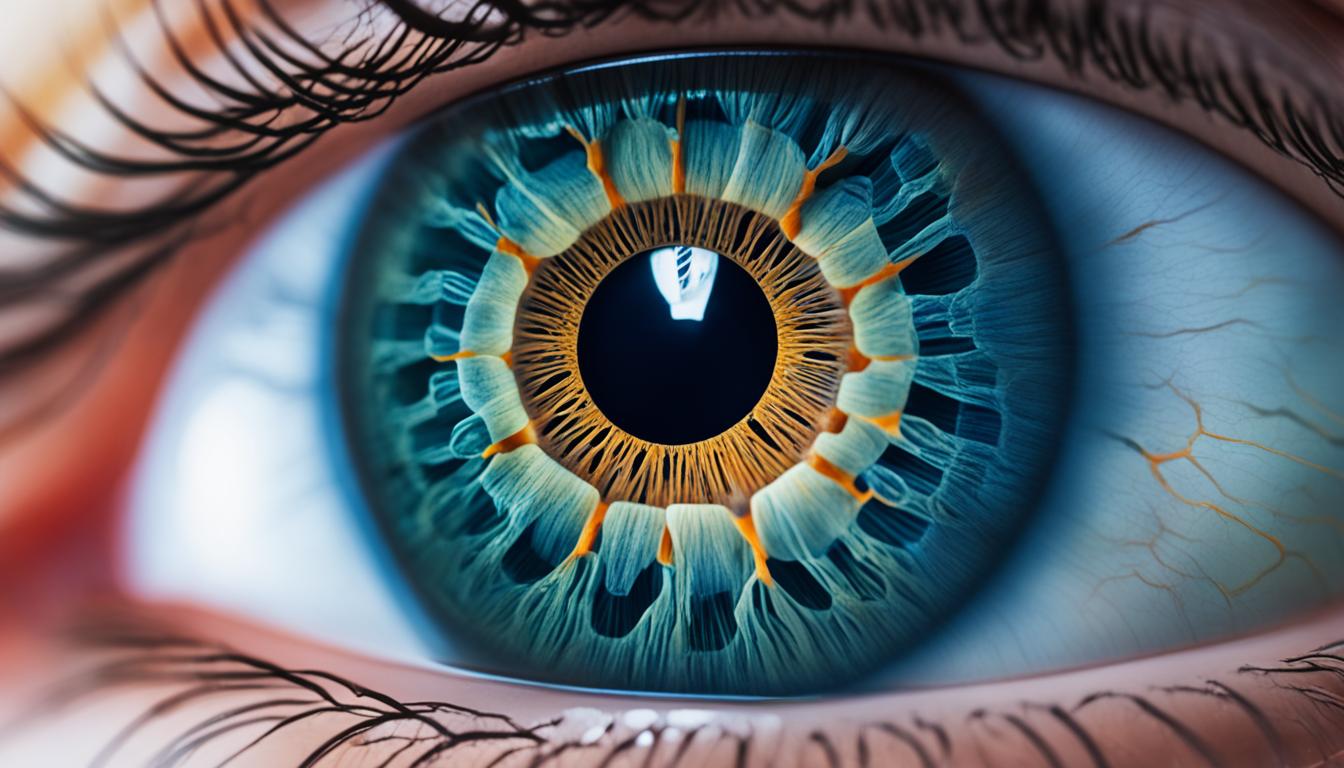Eye floaters are common and many people notice them at some point. They look like small dots, lines, or rings that move through your vision. Although they can be annoying, eye floaters are usually safe and you can often ignore them.
These floaters start when protein fibers in the back of your eye clump up. They then cast shadows on your retina. This is what makes you see those floating specks. Over time, as we age, our eyes also change. Benign floaters are part of this. But, if you suddenly see a lot more, experience light flashes, or lose side vision, it could be serious. In such cases, seeing an eye doctor is important.
Eye floaters might also be linked to more severe eye issues. These can include a detached retina, a torn one, or bleeding in your eye. It’s crucial to notice if your floaters change and get them checked if needed. This way, you can make sure you’re getting the right treatment.
Key Takeaways:
- Eye floaters are small spots or strands that drift through a person’s vision.
- They are caused by protein fibers shrinking and clumping together in the vitreous humor.
- Sudden increase in floaters or other symptoms may indicate a more serious issue and should be evaluated by an eye doctor.
- Eye floaters can be associated with various eye conditions, such as detached retina and torn retina.
- Regular eye care and monitoring are essential for maintaining good eye health.
Causes of Eye Floaters
Eye floaters are pretty common and have a few causes. Knowing what these causes are helps us understand where they come from. It also tells us about possible effects on our eyes.
Posterior Vitreous Detachment
Posterior vitreous detachment is a top cause of eye floaters. It happens as we get older. The jelly-like vitreous humor in our eyes pulls away from the retina. This could also occur in people who are nearsighted or those with specific eye conditions.
Retinal Tear
If eye floaters suddenly increase, it might be a retinal tear. This is a serious problem needing quick medical help. A retinal tear damages or separates the retina from the eye. To avoid worse issues, seeing a doctor fast is crucial.
Eye Injury
Eye floater development is also linked to eye injuries. An injury causing blood or other substances to enter the vitreous can create floaters. This might happen from a strong hit to the eye or something sharp entering the eye.
Diabetic Retinopathy
Having eye floaters could relate to diabetic retinopathy. This comes from diabetes and harms the retina’s blood vessels. It leads to strange blood flow and the start of eye floaters.
Eye Tumors
Though less common, eye tumors can cause floaters too. Tumors affecting the vitreous humor or retina may change how they work. This could mean eye floaters appear in the eye.
If you suddenly see more floaters or your vision changes, get your eyes checked. Sudden floaters with light flashes or a sideways sight loss might point to a serious eye issue. Seeing an eye doctor for a check is wise.
Diagnosis and Treatment of Eye Floaters
If you have eye floaters, seeing a specialist is vital. An eye doctor will examine your eyes closely. They might even do a dilated exam to look at the back of your eye.
Benign floaters usually don’t need treatment. You might just need to check them regularly. Lifestyle changes can also help. But if they start to badly affect your vision, you might need a vitrectomy.
A vitrectomy is a surgery that removes eye floaters. The surgeon takes out the vitreous gel and puts in a salt solution. This can clear your vision by removing the things that are floating in your eye.
Vitrectomy is known to work well, but it’s surgery. This means it has some risks. These include cataracts, retinal detachment, and higher intraocular pressure.
Before choosing a vitrectomy, talk to your doctor. They will explain the good and bad clearly. They’ll help you pick the best option for you.
The Pros and Cons of Vitrectomy for Eye Floaters
| Pros | Cons |
|---|---|
| Reduces the presence of floaters | Potential risks and complications |
| Improves visual clarity | Possible development of cataracts |
| Enhances quality of life by alleviating floaters’ impact on vision | Risk of retinal detachment |
| Potential increase in intraocular pressure |
Think carefully about vitrectomy with your eye doctor. Consider the surgery’s benefits and downsides well before making a choice.
Conclusion
Eye floaters are usually not a big deal. They happen when the gel in your eye changes. They might be linked to different eye issues. If you suddenly see more floaters or have vision problems, it’s smart to see your eye doctor.
Yet, there’s hope on the horizon thanks to new medical tech. Stem cell therapy could make a big difference. It aims to help the retina, which might be the key to better vision. This approach is in its early stages. But, for those with serious eye floater issues, it could be life-changing.
Keeping your eyes healthy is key. Getting check-ups regularly helps spot eye problems early. This lets you or your eye doctor act quickly when needed. Watch for any vision changes. This can help you keep your eyes in top shape and tackle floaters fast.

